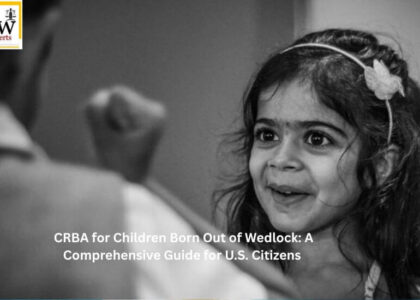The death of a U.S. citizen spouse creates not only an emotional burden but also legal challenges, especially when the surviving spouse seeks to ensure the future well-being and residency status of their children in the United States. Fortunately, U.S. immigration law provides a way for the children of a widow(er) of a U.S. citizen to apply for permanent residency (green card), even after the death of the U.S. citizen parent. This is facilitated through a USCIS petition under specific provisions designed to protect family unity. In this article, I as an Immigration Lawyer will discuss the procedure for filing a USCIS petition for children of a widow(er) of a U.S. citizen, the eligibility requirements, and how SJ Law Experts, based in Islamabad, can assist clients with navigating this process.
What is the USCIS Petition for Children of a Widow(er) of a U.S. Citizen?
The USCIS petition for children of a widow(er) of a U.S. citizen allows minor children to apply for a green card, even if the petitioning parent has passed away. Under U.S. immigration law, children of deceased U.S. citizens who were married to the citizen at the time of death may still be eligible for the same immigration benefits as if the U.S. citizen spouse were alive. The petition is specifically handled through the I-360 form, Petition for Amerasian, Widow(er), or Special Immigrant, which is typically filed by the surviving spouse. If the surviving spouse has already filed an I-360 petition, they may also include their children in this petition. The children of the widow(er) can benefit from the same application process, thus simplifying and streamlining the green card process for all affected family members.
Eligibility Requirements for Children of a Widow(er) of a U.S. Citizen
In order for children of a widow(er) to qualify for a green card under the I-360 petition, certain eligibility criteria must be met:
- Age and Relationship to the Widow(er): The child must be a biological child or an adopted child of the deceased U.S. citizen. For immigration purposes, the child must be unmarried and under the age of 21 at the time of filing the petition. If the child is over 21 years old, they may no longer qualify under this provision unless there are specific exceptions such as the child being a beneficiary of a pending petition filed before they turned 21 (the Child Status Protection Act).
- Parental Relationship: The child must have been living with the U.S. citizen parent (who is now deceased) at the time of death or must have had a legitimate parent-child relationship with the deceased U.S. citizen spouse. This relationship must be legally recognized, and the surviving spouse must be able to provide sufficient evidence of the child’s dependency and relationship.
- No Remarriage of the Surviving Parent: To qualify, the surviving parent must not have remarried before filing the petition. If the surviving spouse remarries, the children of the widow(er) may lose their eligibility for a green card based on the original petition.
- Petition Filing Deadline: The petition must generally be filed within two years of the U.S. citizen spouse’s death. If this deadline is missed, the children may lose their eligibility for a green card based on their deceased parent’s status.
- Good Moral Character of the Surviving Parent: The surviving parent must demonstrate that they are of good moral character. This is a requirement that may be relevant in cases where the widow(er) is filing for adjustment of status after the death of the U.S. citizen spouse.
The Procedure for Filing the USCIS Petition
- Filing the I-360 Petition: The first step is for the surviving parent (widow or widower) to complete and file Form I-360, Petition for Amerasian, Widow(er), or Special Immigrant.
- Petition Approval and Visa Processing: If USCIS approves the I-360 petition, the widow(er) and their children will be eligible to move forward in the immigration process. The next step typically involves adjustment of status for those already in the U.S. or consular processing if they are living outside the U.S.
- Receive the Green Card: Once the petition and adjustment or consular processing are approved, the children (and the surviving parent) will receive their green cards.
- Conditional Residency: In some cases, the family may receive conditional residency if the marriage was less than two years in duration at the time of the U.S. citizen spouse’s death.
How SJ Law Experts Can Assist
The USCIS petition for children of a widow(er) of a U.S. citizen is a valuable opportunity for minor children to receive permanent residency in the United States, even after the loss of their U.S. citizen parent. The process can be complicated, but with the assistance of experienced immigration lawyers at SJ Law Experts, families can navigate the complexities of immigration law with confidence. If you are facing the challenges of seeking a green card for your children after the loss of a spouse, SJ Law Experts is here to provide the legal expertise and support you need. Contact us today to begin the process.
SJ Law Experts | Website: www.SJLawExperts.com | Email: SJLawExperts@gmail.com | Contact: +92 335 411 2288





